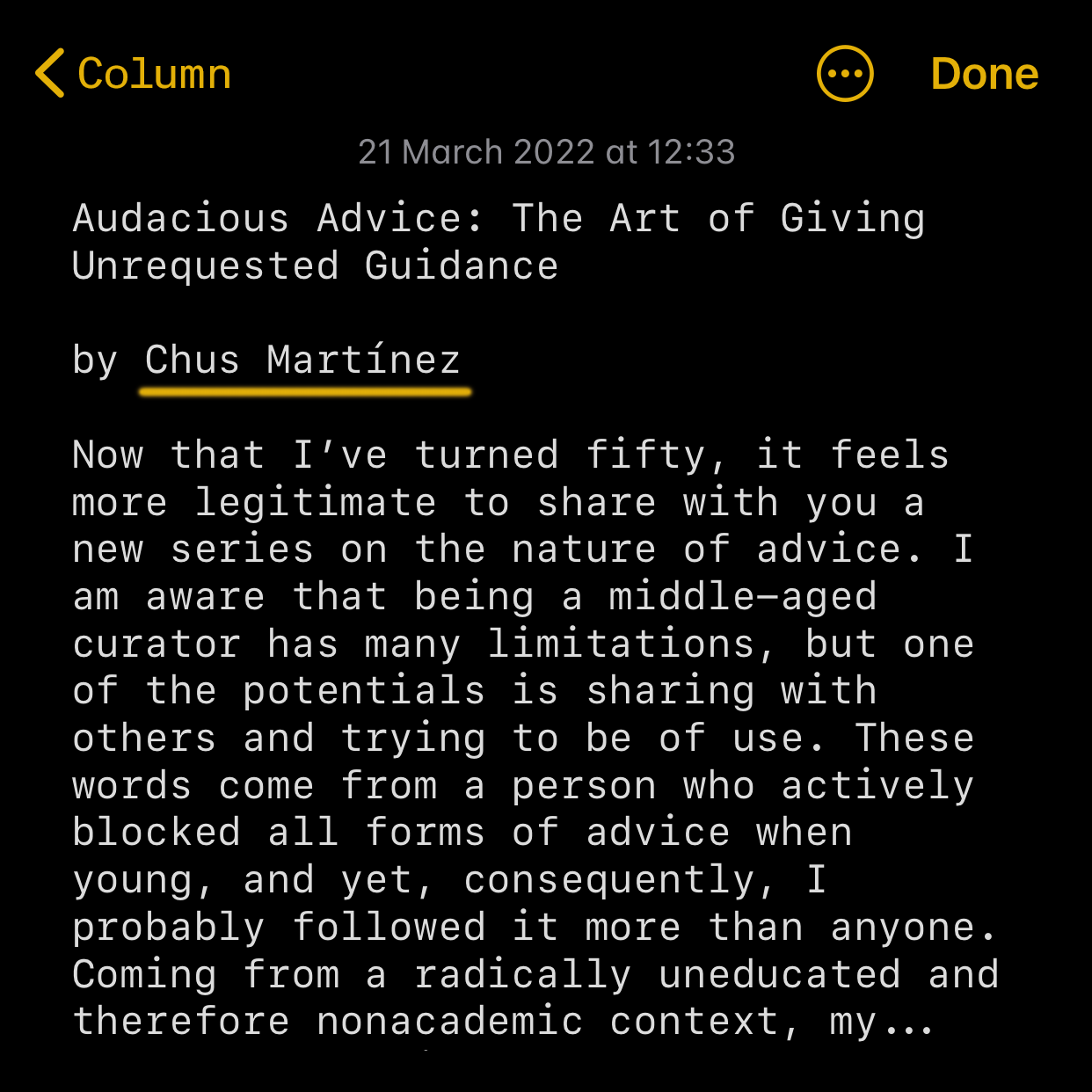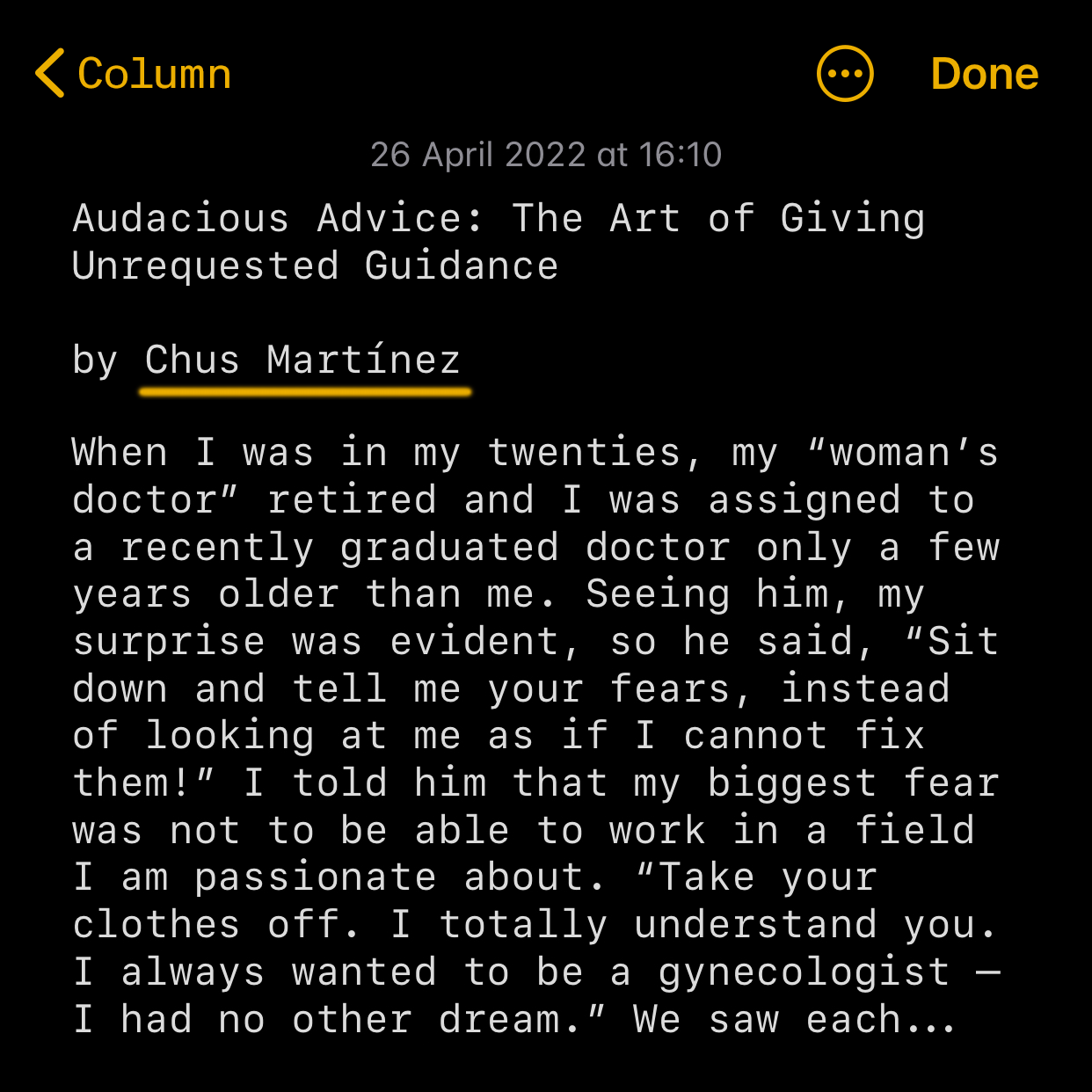A Monthly Column on The Art of Giving Unrequested Guidance.
If money makes the world go mute, what really motivates people to talk are hormones. Sometimes I feel like an inside-out tree exposed to a congress of dendrochronologists (those versed in the science of reading tree rings for chronological and historical data). The first dark ring to be exposed would surely be when I first got my period, which remained hidden to the scientists of the art world because at that point I was too young to work there yet. The second ring, thick and dark, was pregnancy. The hormonal chatterboxes multiply when you hit your mid-thirties, or, as Lamarck would say, in your mid-thirties your ears mature in ways that allow you listen more acutely to those who might be receptive to your potential hormonal transformation, even if you never noticed them before.
Hints and comments relating to your reproductive potential pop up. You start feeling observed — like a poached egg in an English kitchen. “Too early” is replaced by “it is never the right time, and yet…”, which soon becomes “too late.” One goes to work and develops projects and feels surrounded by these hormonal master chefs who foresee your future.
It is horrendously obvious how everyone feels fine showering you with comments on aspects of your life that you might want to keep private, invisible, unspoken, hidden, even repressed. You also wonder why the same collective wisdom is not shared with such intensity with the fathers of curating, with the masters of our institutions, with the makers of our markets. It is almost unnecessary to describe what comes next: one day it becomes obvious to all those people that you are growing a new life right in front of them. To your wish to continue working there are multiple cultural and institutional responses that overlap with your desire to show that you can do it “without an effort.” You then expend all your energy in this attempt to seem “effortless.”
To the pornographic exposure that the social system subjects you to, in multiple and subtle forms, you try to respond with a newly developed nonchalant-ism that results in millions of micro-anxieties that now populate your mind. The reason? Your performance should be affected. As a women in the arts, everything counts — your smaller size, your origin, your pregnancy.
All can be crucial factors in making you noncrucial. You continuously analyze your performance and wonder if others are truly aware of your value. When you were younger, it could have been because you were hypercritical. Later on, because you were not mainstream enough. Then the hormones. Subsequently, the child, the childcare, the balancing act with your job. And, finally, the third ring: your age, your state of decay, the fact that your place is, in any case, elsewhere.
Yes. The third ring, darker and thicker than the second, which is absolutely exposed to the scientific body of the art world, is menopause. On the one hand, media and society address the many problems facing a young body: aging and, of course, weight gain. On the other hand, the media’s incredible ongoing effort to “demythologize” menopause has caused a certain group of women to be more exposed than ever before. Certainly it is important to address all these subjects, to allow all genders within the social sphere to address the multiple transformations that affect our lives. And yet, I feel that, once again, the intention to help us cope with certain issues that “we may be afraid to address” has created a meta-mouth that addresses them in ways that scare the shit out of humanity.
I was recently part of an event in which women my age were in the majority, and I couldn’t help but notice that they were remarkably fit. And I thought: are they reading these friendly articles that anticipate their hormonal debacles? This month I counted fifteen articles in my Twitter feed about weight gain due to hormonal changes; eight addressing mood change; nine discussing insomnia and menopause; and at least five talking about urinary incontinence.
It makes me wonder if I can ever be invited again to a project interview or a life-changing event with all these eventualities being aired publicly. Is this communal review and presentation of certain gender-specific realities really necessary? Is it possible to trust and believe in and truly and sincerely desire our company after all this hormonal outing?
Perhaps I missed it, but as yet I’ve not see any symmetrical efforts to demythologize testosterone deficiency or the progressive loss of libido, or erectile dysfunction, middle-age weight gain, and hair loss… In order words, I am convinced that this ever-growing hormonal empowerment is working, once again, against an understanding of all genders. There are hormonal hierarchies in the arts. My advice: we need to opt out of this brutal hormonal determinism and allow individuals to decide — and work toward — how their hormones are to perform for them.




